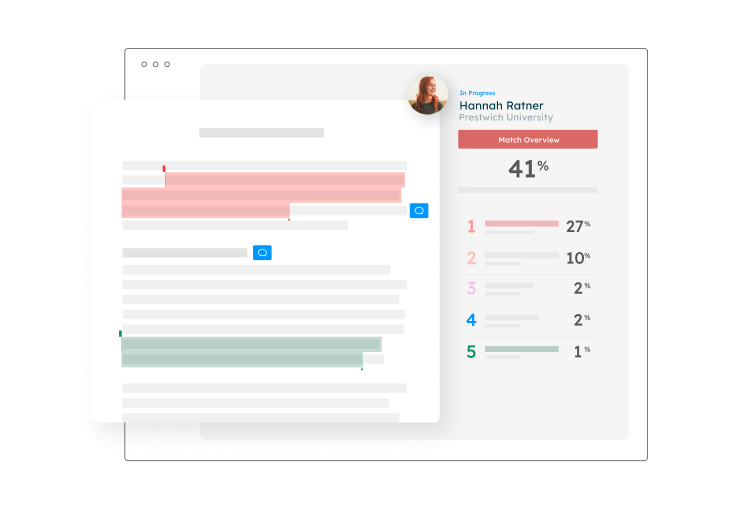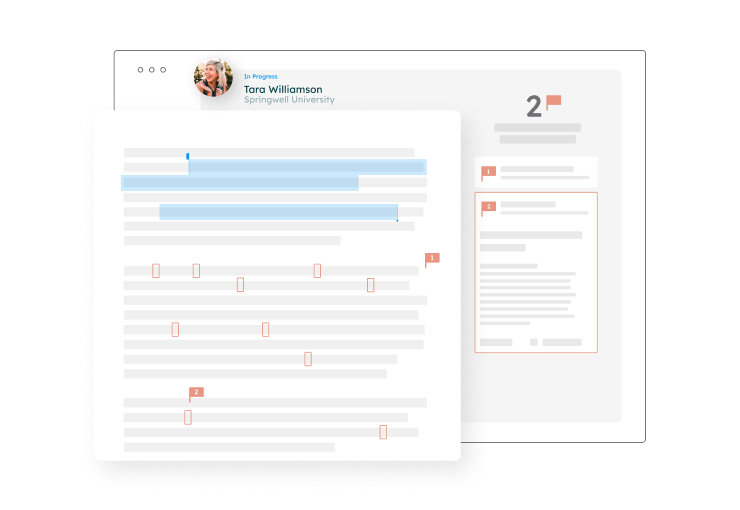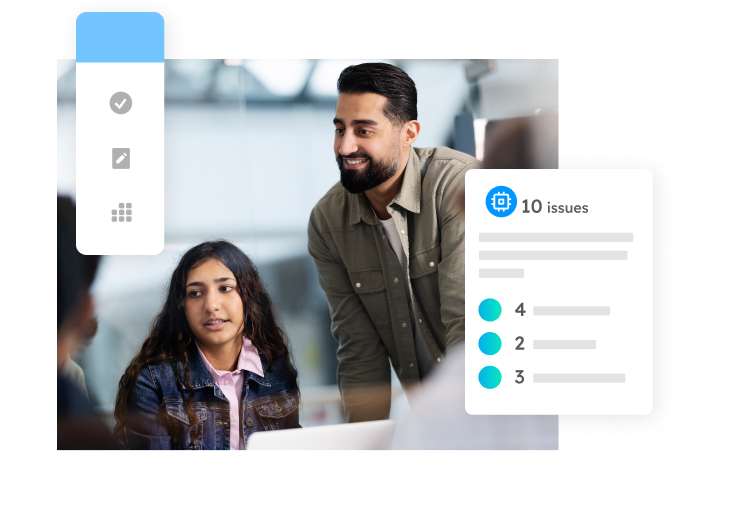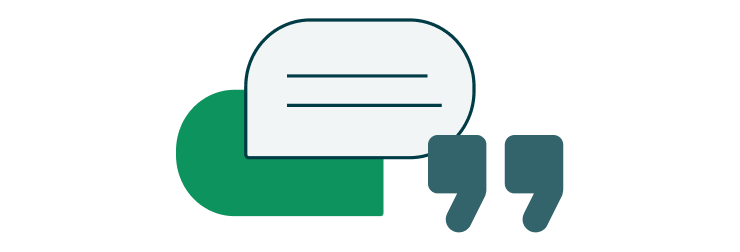Safeguard education with advanced integrity solutions
Streamline your efforts in safeguarding academic integrity with advanced plagiarism detection and AI writing detection that promotes students’ best, original work.
Why academic integrity matters
Academic integrity is integral to student learning and institutions’ efforts to nurture it.
- Prepares students to act ethically and think critically in the classroom and beyond.
- Ensures fair student assessment and authentic learning outcomes.
- Supports responsible use of breakthrough technologies such as AI.
Nurture academic excellence and integrity
Amid new learning opportunities and emerging misconduct risks in the digital, AI-enabled era, supporting the path to academic integrity is vital.

Easy evaluation of student work
Quickly evaluate the originality of students’ work and identify when likely plagiarism, AI-generated text, or contract cheating may be present.

Foster original thinking with formative feedback
Develop students’ original thinking and writing with more frequent, timely, and actionable feedback loops that reduce educators’ grading workload.

Tailor support for every student
Drive responsive teaching that caters to diverse learner needs, supports DEI initiatives, and bridges knowledge gaps for student retention and success.

Uphold your institution’s values and reputation
Maintain the credibility of your programs and credentials by demonstrating compliance with academic standards and promoting faculty satisfaction.

Unlocking solutions for success with Turnitin
From education to research and publishing, Turnitin helps organizations safeguard quality, enhance workflows, and foster innovation.

Turnitin Feedback Studio safeguards institutional reputation and streamlines feedback and grading workflows that lead to student success in writing and beyond. Time-saving formative feedback and grading tools deter plagiarism, help students cultivate writing excellence, and build critical thinking skills that drive career readiness. Assess your way with flexible add-on capabilities including Paper to Digital; supporting paper-based assignments with digital grading workflows, Turnitin Originality; addressing emerging misconduct threats, and Turnitin Clarity; bringing transparency to the writing process in the age of AI.


Turnitin Similarity protects against plagiarism and student collusion to safeguard your institution’s reputation and teach the value of original writing. Its industry-leading Similarity Report identifies unoriginal or improperly cited student writing by highlighting similarities to the world’s largest collection of internet, academic, and student paper content. Integrated with all the top learning management systems and trusted by educators globally, Turnitin Similarity makes academic integrity a part of your workflow.

Ready to talk? Chat with an expert.
Schedule a callDiscover a suite of solutions that empower the education community

Students
Ensure students develop original thinking skills, feel empowered to take the next steps in their learning journey, and earn their grades and credentials with honesty.

Instructors
Provide actionable, meaningful feedback to learners in less time and with greater consistency and fairness, while gaining confidence in the authenticity of student work.

Administrators
Access secure data insights and reporting to improve course and student performance, and uphold academic standards across your institution amid developments such as generative AI.

Institutions
Preserve reputation, differentiate and scale course offerings, and inform curriculum and assessment strategies to elevate teaching and learning outcomes.
Scalability for growing institutional needs
Turnitin solutions seamlessly integrate with a wide array of third-party platforms and systems, enabling custom workflows for organizations of all sizes. Our flexible user management and centralized controls support large-scale collaboration across various environments. Leveraging a robust global cloud infrastructure, we ensure secure, high-standard data processing that can easily scale to meet the evolving needs of our customers, whether in education, research, or business.
Trusted by leading institutions worldwide
“They had nothing to lose and that’s the great thing about [the Turnitin] draft process. By the time they submitted their final papers, students had righted things and had done exactly what we hoped they would do.”
Jen Simonds, Assistant Vice President for Academic Integrity and Accountability, University of Maryland Global Campus
Ready to talk? Chat with an expert.
Academic integrity FAQs
Collapse all
What is academic integrity?
Academic integrity is more than just an avoidance of misconduct; it's a commitment to a set of values throughout the student journey, inspiring a lifelong commitment to learning. The International Center for Academic Integrity defines these fundamental values as: honesty, trust, fairness, respect, responsibility, and courage. Academic integrity nurtures confident and resourceful learners who are less likely to engage in learning shortcuts, and is a predictor of future behaviour beyond the classroom.
What are the most common types of academic misconduct?
Academic misconduct commonly manifests as plagiarism, including paraphrasing plagiarism; rephrasing a source’s ideas without proper attribution, word-for-word plagiarism; copying and pasting content without proper attribution, source-based plagiarism; providing inaccurate or incomplete information about sources such that they cannot be found, and self-plagiarism; reusing one’s previously published or submitted work without proper attribution. Contract cheating, enlisting a third party to complete work on their behalf, is another common form, along with emerging AI writing misuse, where AI-generated text is used without authorisation or acknowledgement.
What are ways to build a culture of academic integrity in the classroom?
The academic culture of an institution has a major influence on whether a student will engage in misconduct. Key steps to nurturing a culture of academic integrity include: determining a shared definition of academic integrity, establishing an institution-wide policy, assessing common pitfalls and challenges, utilizing technology and tools that support authentic work, and teaching, sharing and modelling best practices early and often. When a culture of integrity is deeply embedded, ethical behaviour takes root, and student missteps become teachable moments.
How has the rise of AI tools changed the conversation around academic integrity?
While the values that underpin academic integrity remain steadfast, academic integrity is evolving in an AI-enabled environment. 92% of educators and 88% of students anticipate an expanded role for AI in education over the next two to three years , requiring a framework to govern AI’s use and reconcile it with our renewed expectations for academic integrity. Students’ generative AI use is not incompatible with academic integrity, but more needs to be done to build trust in the use of AI in education.
How does Turnitin’s plagiarism detector work?
Checking for plagiarism is a priority for institutions, and with Turnitin’s plagiarism checker, you can make academic integrity a part of your daily workflow and yield a meaningful reduction in academic misconduct rates. Powered by our industry-leading Similarity Report, it supports plagiarism detection by identifying every instance of text similarity in student work against our world-leading content database of internet, academic, and student paper content. Turnitin’s plagiarism detector doesn't make the final judgment on whether plagiarism has occurred; rather, it’s a similarity checker that flags potential areas of concern so that educators can assess whether the matched content is appropriately cited, falls within acceptable limits, or requires further investigation.
How does Turnitin’s AI writing detection work?
Turnitin’s AI writing detector identifies how much of a student’s submission is authentic, human-written content vs likely AI-written content or likely AI-written and AI-paraphrased text, providing insights educators need to determine their next course of action. Its less than 1% false positive rate ensures students are not falsely accused of misconduct. The aim of the tool is to facilitate conversations and teaching interventions on the use of AI writing tools and use it as one strategy in your toolkit to encourage responsible use of them.
What makes Turnitin different from other academic integrity software?
Turnitin provides a flexible, unmatched array of integrity tools and integrations that are time-tested and incorporate evolving educator and student needs. Over 16,000 institutions globally entrust Turnitin to support their integrity workflow, with access to the most effective writing integrity solution and similarity checker from a comprehensive content database. And with Turnitin, you can go beyond text similarity to combat emerging threats and view a submission’s similarity, AI writing indicator, and writing composition history in a single workflow, to optimize educator time and focus.
How does Turnitin ensure the security of my data?
Turnitin prioritizes the security of your academic data by implementing robust protective measures. Data is stored in highly secure regional data centers, ensuring compliance with local data privacy regulations, and additional security features safeguard your information throughout the process. With stringent privacy and protection policies, Turnitin ensures that academic data is handled with the utmost care, providing administrators, instructors, and students with the confidence that their work is secure and safe from risk.




